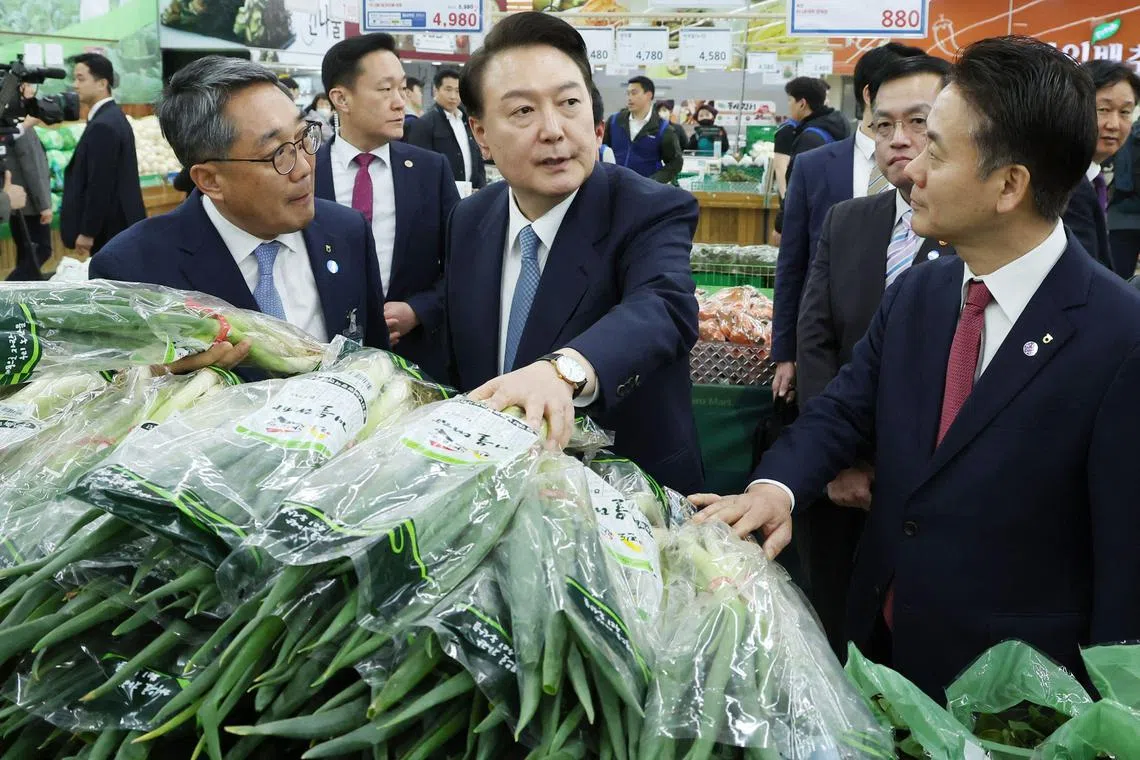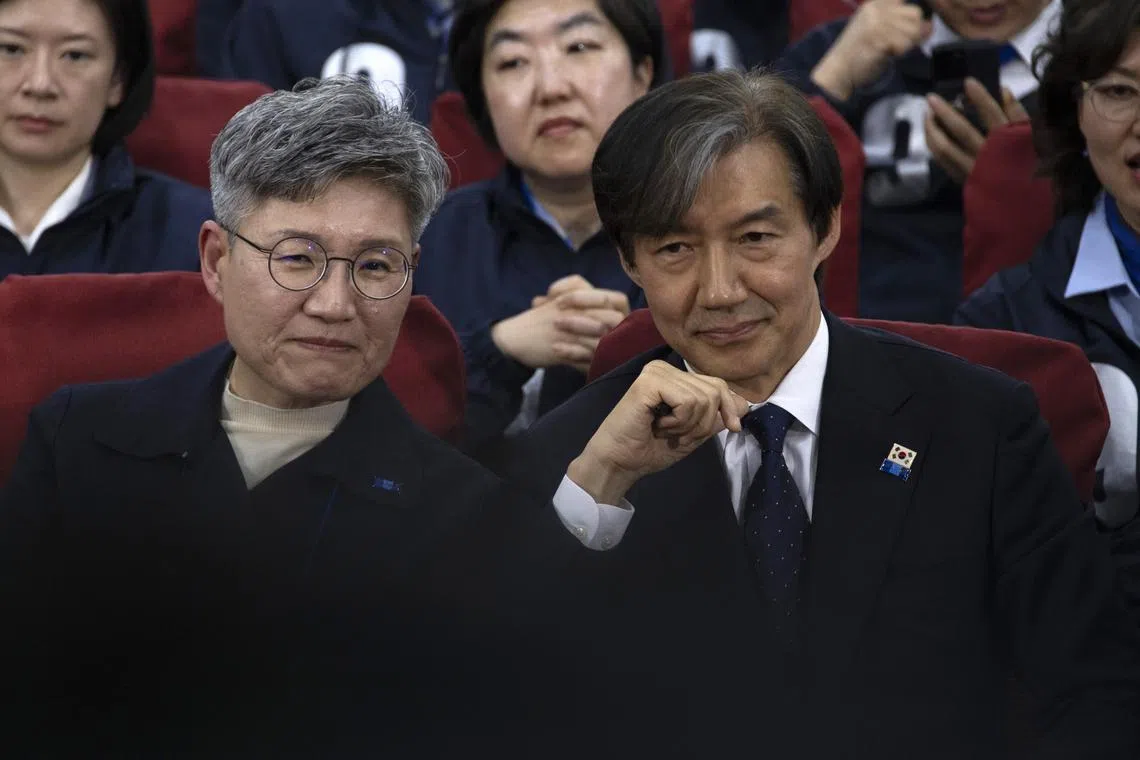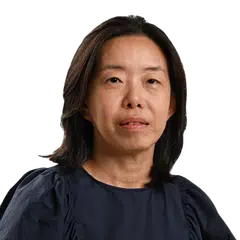News analysis
Lame duck period looms for South Korea’s Yoon as ruling party awaits election defeat
Sign up now: Get insights on Asia's fast-moving developments

South Korean President Yoon Suk Yeol had stirred up public anger in January after exercising his presidential veto to shield his wife.
PHOTO: AFP
Follow topic:
SEOUL - With exit polls on April 10 indicating a significant election defeat for South Korea’s ruling People Power Party (PPP), analysts have warned that President Yoon Suk-yeol’s administration may be crippled in the National Assembly and be unable to push through policies.
They also say the opposition’s anticipated victory signals the people’s desire to punish the President for his administration’s poor management, especially in economic matters, and should serve as a wake-up call for him to change the take-no-prisoners leadership style he has become known for.
As at 11pm Singapore time on April 10, the opposition Democratic Party (DP) had secured 159 seats and PPP 92, with 70 per cent of votes tallied.
Some 29.66 million people, or 67 per cent of eligible voters, cast their ballots on April 10,
Preliminary indicators show that DP, the largest opposition party, could sweep 184 to 197 seats – up from the 156 it currently holds in the 300-seat National Assembly. A two-thirds majority would give it the power to amend the Constitution.
Exit polls released by major broadcasters KBS, SBS and MBS news, based of about 500,000 people at 2,000 polling stations nationwide, showed that PPP will win not more than 100 seats. It currently holds 114 seats.
Exit polls are largely on target, having last accurately predicted President Yoon’s win over biggest rival Lee Jae-myung during the 2022 presidential election.
The final results are expected to be released only on April 11, as the ballot papers are being manually counted for the first time in 30 years. Election officials have said that machine sorting followed by manual counting would ensure transparency and prevent potential election rigging.

South Korean Former minister of Justice Cho Kuk (right), leader of the South Korean Rebuilding Korea Party and candidates, watch TV the results of the exit poll on April 10.
PHOTO: EPA-EFE
Along with minority party allies like Rebuilding Korea Party (RKP), led by former justice minister Cho Kuk, which is predicted to win between 12 and 14 seats, the opposition may secure a legislative majority that would set back President Yoon’s administration in more ways than one.
Apart from the incumbent government being rendered powerless to push through its policies, a 200-seat opposition majority would also curb Mr Yoon’s presidential veto powers for the remaining three years of his five-year term, and open him to the risk of impeachment, analysts told The Straits Times.
Sogang University political scientist Kim Jae-chun warned: “If DP and RKP win more than 200 seats, President Yoon may become a dead duck, not just a lame duck. For one thing, Yoon’s presidential veto can now be overridden. With 200 seats, the opposition parties can even amend the Constitution, if they desire so.”
A landslide loss would be a “significant blow” to the Yoon administration, said a senior fellow at the George H.W. Bush Foundation for US-China Relations, Dr Lee Seong-Hyon. The opposition could “theoretically impeach President Yoon for what his opponents call an abuse of power”, he noted.
President Yoon, the former prosecutor-general who came to power through a slim margin in 2022, had stirred up public anger in January, when he exercised his presidential veto to shield his wife, Ms Kim Keon-hee, from charges of stock manipulation. Ms Kim also created controversy when she accepted a designer handbag from a pastor, which many people felt was inappropriate.
While Mr Yoon’s track record as prosecutor general had launched his political career, his leadership has come under fire for perceived ethical failings.
The President’s refusal in a special interview in February to issue a public apology or offer a clear explanation of the controversies surrounding the First Lady further exacerbated the perception of his insensitivity towards ordinary people.
Compounded with public unhappiness over his handling of a prolonged doctors’ strike, and a recent gaffe over the price of green onions, he made for an easy target for political foes during the election campaign.
In the days leading up to the polls, opposition politicians gleefully carried bunches of green onions – a staple of Korean cuisine – and ridiculed the President for being out of touch with the masses.
Mr Lee, the DP leader who lost the 2022 presidential race by a whisker, told voters that Mr Yoon’s “regime had betrayed the people by dragging down the country in all aspects of the economy, people’s livelihoods, diplomacy, security and democracy, and destroying all the achievements of the Republic of Korea that have been built with the power of our people so far”.
Echoing Mr Lee’s call to bring Mr Yoon and his ruling party down was an old foe of the President, RKP’s Mr Cho, whose election pledge was to make Mr Yoon’s government not just a lame duck, but a “dead duck”.
Mr Cho’s appointment as justice minister in 2019 was short-lived as a result of investigations led by Mr Yoon, as prosecutor-general, into alleged fraud and bribery by the Cho family.
In a highly polarised election where people were less interested in policy pledges than in penalising the President and his government, Mr Yoon must ultimately take responsibility for his party’s poor showing, says Professor Kim.
“I think no one in this country likes Yoon Suk-yeol and Kim Keon-hee, even the conservative supporters. This election is all about retrospective voting, which means that you evaluate and punish the sitting government for its double standards and hypocrisy,” he noted.
Kyonggi University’s professor of political science and law Hahm Sung-deuk said it was Mr Yoon’s hubris that had made him so widely unpopular, even among his party supporters.
“People feel that the current president’s political style shows too much hubris, or a stuck-up attitude, and the older people who are usually conservatives, they do not like this.”
Prof Hahm said that the election result will be a wake-up call for President Yoon to change the tone of his political behaviour in order to work with the opposition majority.
“Without the cooperation of the opposition, the government cannot implement any policies. President Yoon has no alternative but to work with the opposition whether he likes it or not, as he has no other political resources,” he said.
As for the opposition, who are set to emerge victorious in the election, with greater power will also come greater responsibility, said analysts. If they pose too much of an obstacle to the incumbent government, it might backfire on them.
“With a divided government where the executive branch is controlled by one party and the legislature controlled by the other party, if things go nowhere, voters will tend to punish the opposition party as well. So now, the opposition party is a stakeholder,” said Prof Kim.
“If South Korea struggles in the future, people may start thinking that part of the reason is the majority opposition getting in the way of the incumbent government’s policy initiatives.”
In particular, more will be at stake for the opposition leader, Mr Lee, who is widely tipped to make another presidential bid in 2027, said Prof Hahm.
“To become president, Mr Lee will need to widen his support base among the moderate, or swing voters. In order to do so, he will have to prove his political skills, and show that he can work with a minority ruling party,” he said. “People will want to see his governing ability, not just as the chairman of the opposition party.”


